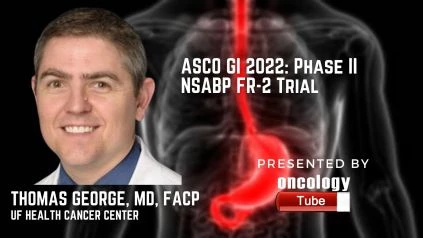Thomas George, MD, FACP, Professor, MD-Hematology/Oncology from UF Health Cancer Center. In this video, he speaks about the ASCO GI 2022 Abstract – Phase II study of durvalumab following neoadjuvant chemoRT in operable rectal cancer: NSABP FR-2.
Â
Â
Origins:
Â
Although immunotherapy has not been shown to improve anti-tumor activity in microsatellite stable (MSS) colorectal cancer, preclinical models suggest that radiotherapy (RT) can improve neoantigen presentation, modulate the microenvironment, and increase the likelihood of anti-tumor activity when combined with checkpoint inhibitors. This prospective phase II trial will use a “window-of-opportunity” study design to test the safety and activity of this method with the anti-PD-L1 drug durvalumab (MEDI4736).
Â
Methodologies:
Â
Patients with MSS rectal cancer in stages II/III who underwent conventional NCCN guideline-compliant neoadjuvant chemoradiotherapy (CRT) and definitive surgery were eligible. Durvalumab (750mg IV infusion once every 2 weeks) was given in four doses, starting 3-7 days after CRT was completed and ending 8-12 weeks following the final CRT dosage. Improvement in modified neoadjuvant rectal cancer (mNAR) score (goal 10.6) compared to historical controls (15.6), with a 20 percent DFS RR decrease and a 3-4 percent absolute OS improvement as the primary end point (EP). Toxicity, pCR, cCR, therapy completion, negative surgical margins, sphincter preservation, and exploratory assessments of tumor-infiltrating lymphocytes, tumor-infiltrating lymphocytes, tumor-infiltrating lymphocytes, tumor-infiltrating lymphocytes, tumor-infiltrating lymphocytes, tumor-infiltrating lymphocytes, tumor-infiltrating lymph Immunoscore, circulating immunologic profiles, and molecular predictors of response are all examples of response predictors. H0: mNAR 15.6 against HA: mNAR 15.6 is tested one-sided at alpha 0.10, with statistical significance defined as p0.1.
Â
Findings:
Â
45 people were enrolled from May 2018 to October 2020, with 40 of them evaluable for mNAR. The mean mNAR (80 percent CI: 9.29-14.97) was 12.03 (p=0.06 one-sided). R0 resection=81.0 percent, and sphincter preservation=71.4 percent. pCR=22.2 percent; cCR=31.1 percent; R0 resection=81.0 percent; and sphincter preservation=71.4 percent. The side effects were consistent with the safety profile of both CRT and durvalumab. Diarrhea, lymphopenia, and back discomfort were the most common grade 3 AEs. There was only one AE of grade 4 (elevated amylase/lipase) and no AEs of grade 5. Other immunologic end goals, both secondary and correlated, are presently being evaluated.
Â
Outcomes:
Â
Durvalumab given immediately after CRT and before surgery for definitive treatment of rectal cancer was found to be safe and free of unanticipated short-term side effects. The primary endpoint of the mean mNAR score was significantly lower than our historical control, indicating that more research is needed. Correlative assessments for immunologic response indicators such as PD-(L)1 expression and Immunoscore are currently underway. 03102047 (National Center for Technology Assessment). AstraZeneca-Medimmune and the NSABP Foundation provide support. NCT03102047 is the number for the clinical trial.

